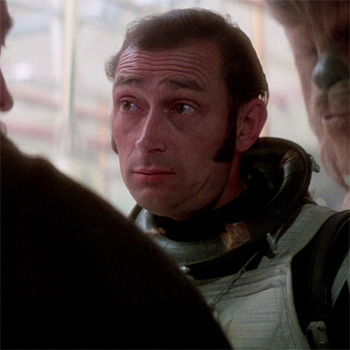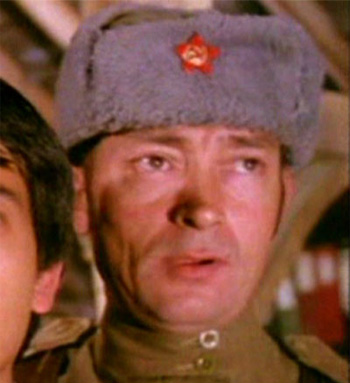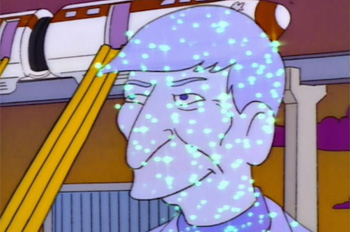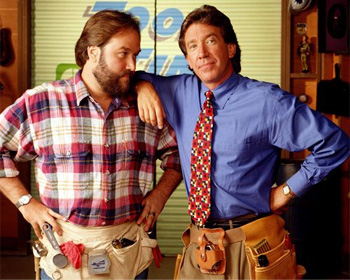6 Small Roles With Hugely Interesting Backstories

By now, all of you probably know that Harrison Ford was a carpenter when he was cast as Han Solo, or that The Walking Dead's Daryl only exists because Norman Reedus got wrecked at a party. (And if you don't, go read those articles and come back here.) Our point is, enough has been written about the stars of these movies and shows. But what about the minor characters, extras, and cameos? Are they not people too? Well no, they're characters. But still, here are some fascinating behind-the-scenes stories about them:
Nobody Knew Who Played The Most Important (Technically) Character In Star Wars Until Recently
Quick, who's the most impactful character in Star Wars? Obi-Wan? Luke? Anakin? Leia? R2-D2? That one carpenter dude? Benicio del Toro? Nope, wrong. It's this guy:

That's BoShek, the pilot whom Obi-Wan and Luke originally approach in the Mos Eisley Cantina about hitching a ride to Alderaan. He's too busy, he says, but he's more than happy to recommend some scruffy-looking nerf herder and his big dumb walking teddy bear. After that, BoShek disappeared from the franchise ... and real life. For whatever reason, the name of the actor who played him never appeared in the end credits of Star Wars -- or, indeed, anywhere. Entire books have been written about this series' ships, planets, alien species, costumes, and even all the beep-bop and SHHHHWNG sounds, but for over 30 years, no one thought to look into who this guy was.
Related: 5 Side Characters Who Stole The Show In Famous Movies
It wasn't until 2015 that someone got interested in solving the mystery. Bill Jensen, a blogger and crime journalist, noticed the unintentional eradication of BoShek from the history of Star Wars and set about pumping everyone tangibly related to the films, from LucasArts creative directors to autograph hunters to other bit part actors who were actually credited. The only lead was that the guy who played BoShek also appeared in an episode of the '70s TV series The New Avengers.

Buoyed on, Jensen continued his search and hit up casting agencies, directors, fan forums, and genealogy websites, with no luck. That is, until a family member emailed him out to say that BoShek was played by Frances Alfred Basil Tomlin, who it turns out also played a stormtrooper. Tragically, Tomlin passed away in 2004, when Attack Of The Clones was the most recent Star Wars movie. Let's all pour a glass of ... be right back, Googling "star wars drinks" ... uhh, Wookie-wango in his name.
Vin Diesel Gets A Special Groot-ified Script For Guardians Of The Galaxy
We're definitely getting some hate mail for classifying Guardians Of The Galaxy's Groot as a minor character, but consider this: The guy (tree) only has one line of dialogue. He says it a lot, sure, but one line is one line. On the face of it, Vin Diesel has a sweet gig providing Groot's voice. He doesn't have to don hours of prosthetics, he doesn't have to get tiny balls stuck to his face, and he gets to just sit there and say "I am Groot" in a seemingly random number of ways. Like, can that even be called work? If the entire cast of GOTG walks before the next installment, can we have that job?
Probably not, because the role of Groot actually requires a lot of acting ability -- and we're not merely referring to how Diesel voices the character in 15 different languages.
Although his lines amount to little more than sci-fi baby talk, Diesel got a special script for GOTG 1 and 2 containing the translations of what Groot is saying to help him properly convey the necessary emotions of each scene. It would, after all, be rather noticeable if Groot spent one any of the big feels-inducing moments shouting in a tone normally reserved for the Grootified version of "Turn Down For What." (Before you ask, there's no copy of this script anywhere, thanks to its circulation being restricted to only Vin Diesel and James Gunn.)
Related: 34 Badass Minor Characters You Ignored In Famous Movies
Michael Jackson Didn't Sing In His Simpsons Cameo -- He Hired His Own Impersonator
The Simpsons has had more celebrity cameos than actual episodes by now, and perhaps the greatest is Michael Jackson as Leon Kompowsky in Season 3's " Stark Raving Dad" -- not only because it's a great episode, but also because it took years for anyone to admit that yes, that was Jackson. After all, the show's credits list the voice as being provided by "John Jay Smith," while the role itself (a mental patient who thinks he's Michael Jackson) lent the whole thing an air of plausible deniability.
In reality, MJ did appear in the show. He was a huge fan and had already helped write the cultural touchstone that was "Do The Bartman." But as for his singing? That was provided by a soundalike, Kipp Lennon, for reasons that were never made clear to the crew, other than MJ maybe wanting to play a prank on his brothers. Or as Harry "Half of Springfield's Residents" Shearer speculated at the time, "We've paid just enough for the speaking Michael Jackson, but we can't afford the singing Michael Jackson."

The in-house confusion about MJ's appearance (remember, the anonymity meant that this episode couldn't be marketed as having the best cameo ever) resulted in a new rule that any celebrity cameos must be credited properly. This probably works really well for the producers, but nowadays ... well, if you were cameoing on The Simpsons, would you want your cool celebrity friends to know about that? Exactly.
And while we're on the subject of The Simpsons ...
Leonard Nimoy Only Appeared In "Marge Vs. The Monorail" Because George Takei Didn't Want To Disrespect Public Transportation
OK, so we could spend an entire paragraph and explain the ins and outs of The Simpsons' " Marge vs. The Monorail," or we could cut the crap and watch not only the show's best musical number, but one of the best musical numbers in all of human history.
Another thing that the episode had going for it was a guest appearance by Leonard Nimoy, but it wasn't always supposed to be him. The producers ruled out asking Nimoy to appear on the show early on because they figured they couldn't get him, so they settled for a more affordable Star Trek actor, George Takei. Mr. Sulu accepted the role and demanded several script changes, only to drop out at the last minute. Why? Because he had a side gig as a member of the board of the Southern California Rapid Transit District. Apparently, Takei decided that appearing in an episode wherein a con man steals the town's money and delivers a substandard service would be an even bigger insult to public transportation than, well, California's public transportation.
Related: 28 Great Movies From The Perspective Of Minor Characters
After Takei dropped out, the producers figured they might as well try their luck and ask Nimoy if he wanted to step in. To their surprise, he said yes (at which point they probably said, "Dammit, wish we'd tried Shatner"). It's hard to say who came out better, considering that Nimoy's cameo is consistently regarded as one of the show's best and, as you know, nobody has disrespected public transportation since 1993, thanks to Takei.

Richard Karn Landed The Role Of Al In Home Improvement After A Fortuitous Traffic Violation
The '90s sitcom Home Improvement is the main reason we now know Tim Allen as a family-friendly actor and not an unsuccessful cocaine smuggler. It dealt with Allen as the host of a show-within-a-show called Tool Time -- which, if not for Allen's sidekick Al, would have been 22 minutes of Allen grunting and "accidentally" hitting himself in the nuts with a hammer in order to feel a high, any high. Al was biting, bitter, witty, and funny, and we got him because LA traffic is Hell.
The man behind Al, Richard Karn, was an apartment manager and aspiring actor who had recently moved to LA when he got his big break in the form of a ... traffic ticket for rolling through a stop sign. Karn was forced into attending traffic school, where he often found himself sitting next to an agent looking for someone to appear on this pokey show about a pokey DIY show. Originally, Karn wasn't to play Al, just some random guy whose main character schtick was "an ulcer that flared up every time Tim did something stupid."

The role of Al had already been taken by Stephen Tobolowsky (known for Groundhog Day, Silicon Valley, and Groundhog Day), but he had to drop out to appear in a movie, leaving the part wide open for Karn to take and make his own. So there you have it, kids: If you want to make it big in showbiz, the two paths are "selling cocaine" and "breaking as many traffic laws as possible."
James Hong Is The Most Prolific Actor In Hollywood History Despite Enduring Endless Racist Bullshit
Even if you don't know who James Hong is, you know who James Hong is. He's played countless roles in productions both big and small, from Airplane! to Chinatown to Blade Runner to Big Trouble In Little China to Seinfeld to Kung Fu Panda to Sherlock Gnomes. His 500+ screen credits mean that he holds an informal record as the most prolific actor in Hollywood, living or dead.
It wasn't easy to do this for a variety of reasons, not least of which is that ... how do we put this? The fact that society is racist as balls?
Despite getting his start in showbiz as a professional impersonator on Groucho Marx's You Bet Your Life, the only roles that were open to actors like Hong were racist caricatures come to life. Instead of sucking it up and resigning himself to playing Chinese Waiter #2 for the rest of his life, Hong decided to do something about it. When he and several other Asian actors were offered roles in Confessions Of An Opium Eater as "prostitutes and opium eaters," they held a sit-in in the director's office and tried to reason with him -- complaints that said director ignored in favor of making the movie anyway. Unperturbed, Hong became president of the Asian American Pacific Artists guild, and began a letter-writing campaign to studio heads imploring them to start envisioning Asian people as, um, people.
If studios weren't offering Asian actors roles, Hong decided to make up some instead, and so teamed up with future Oscar nominee Mako Iwamatsu to put together a stage production of Rashomon. The play ran for two years, and the resulting theater company has continued working for half a century and counting. The troupe's success helped Hong get better parts, although he was still getting racist pushback during this time. And even though things aren't exactly perfect right now, he says, "After 50 to 60 years, things are starting to look better. I never thought it would take this long. At least I'm alive to see it, but it took this long to get this far."
Man, no one tell him about the internet.
Adam Wears is onTwitterandFacebook, and hasa newsletter about depressing historythat you should definitely subscribe to.
Although, tell him about our book maybe?
Support your favorite Cracked writers with a visit to our Contribution Page. Please and thank you.
For more, check out 3 Side Characters Who Deserve Their Own Movie - Obsessive Pop Culture Disorder:
Follow us on Facebook. And we'll follow you everywhere.